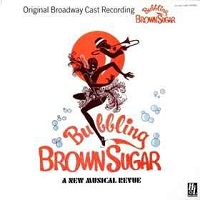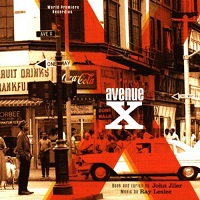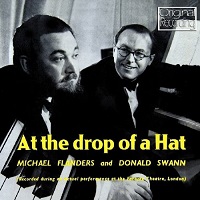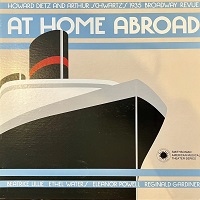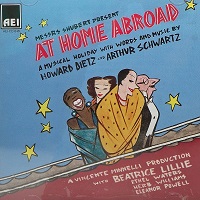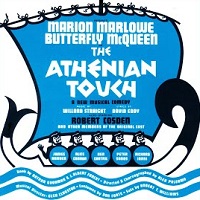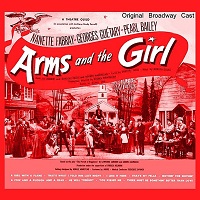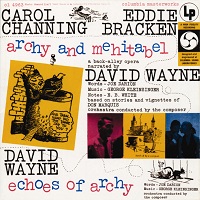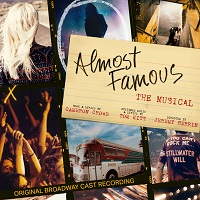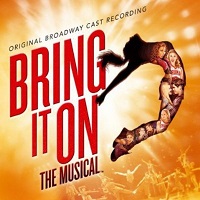 Original Off-Broadway Cast, 2024 (Concord Theatricals)
Original Off-Broadway Cast, 2024 (Concord Theatricals)  (3.5 / 5) Teeming with interesting ideas about ethics, journalism, the generation gap, and sexism, The Connector presents its audience with a key question: Would you rather read the facts, or the “truth?” Daisy Prince was a major creative force behind the show, which she directed Off-Broadway in early 2024. Jason Robert Brown provided the music and lyrics, and Jonathan Marc Sherman wrote the book. All three were inspired by the true stories of Stephen Glass and Jayson Blair, who respectively duped The New Republic and The New York Times into publishing articles that were partly fabricated or, in some cases, completely false. Ben Levi Ross leads the company as Ethan Dobson, the charismatic but duplicitous reporter at the center of the story, and his vocal talent is one of the greatest strengths of this recording. He is matched by Hannah Cruz in the role of Robin Martinez, a fellow journalist who quickly becomes suspicious of Ethan’s articles. Also on hand are stage veterans Scott Bakula and Jessica Molaskey, paired well with the newcomers. Bakula plays the jaded editor in chief of The Connector, and his wry rendition of the song “Now What?” reflects the divide between the older and younger generations; Molaskey is wonderful as the magazine’s longest-tenured fact checker, the first member of the staff to see through Ethan’s facade. In a humorous role, Max Crumm plays the subject of one of the fabricated articles, a West Village hustler whose game of choice is Scrabble. The show’s writers have given the cast powerful material in songs such as “Proof,” “The Western Wall,” and “There Never Was.” Brown’s score is appropriately varied and tuneful, and certainly reflective of the show’s setting in the 1990s; if it’s not as catchy as some of his previous work, his lyrics will be sure to stick with listeners and make them think. The final song is haunting as it derides the ethics of modern journalism and the gullible nature of the public with the searing line: “We believe what we believe, and all we want is someone to confirm it.” In the age of “fake news,” “alternative facts,” and unregulated online information sources, this recording is a timely listen. — Forrest Hutchinson
(3.5 / 5) Teeming with interesting ideas about ethics, journalism, the generation gap, and sexism, The Connector presents its audience with a key question: Would you rather read the facts, or the “truth?” Daisy Prince was a major creative force behind the show, which she directed Off-Broadway in early 2024. Jason Robert Brown provided the music and lyrics, and Jonathan Marc Sherman wrote the book. All three were inspired by the true stories of Stephen Glass and Jayson Blair, who respectively duped The New Republic and The New York Times into publishing articles that were partly fabricated or, in some cases, completely false. Ben Levi Ross leads the company as Ethan Dobson, the charismatic but duplicitous reporter at the center of the story, and his vocal talent is one of the greatest strengths of this recording. He is matched by Hannah Cruz in the role of Robin Martinez, a fellow journalist who quickly becomes suspicious of Ethan’s articles. Also on hand are stage veterans Scott Bakula and Jessica Molaskey, paired well with the newcomers. Bakula plays the jaded editor in chief of The Connector, and his wry rendition of the song “Now What?” reflects the divide between the older and younger generations; Molaskey is wonderful as the magazine’s longest-tenured fact checker, the first member of the staff to see through Ethan’s facade. In a humorous role, Max Crumm plays the subject of one of the fabricated articles, a West Village hustler whose game of choice is Scrabble. The show’s writers have given the cast powerful material in songs such as “Proof,” “The Western Wall,” and “There Never Was.” Brown’s score is appropriately varied and tuneful, and certainly reflective of the show’s setting in the 1990s; if it’s not as catchy as some of his previous work, his lyrics will be sure to stick with listeners and make them think. The final song is haunting as it derides the ethics of modern journalism and the gullible nature of the public with the searing line: “We believe what we believe, and all we want is someone to confirm it.” In the age of “fake news,” “alternative facts,” and unregulated online information sources, this recording is a timely listen. — Forrest Hutchinson


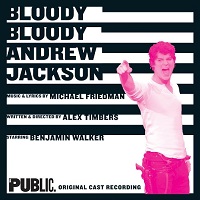
 (1.5 / 5) Before Hamilton took the world by storm in 2016 with a musical style previously underrepresented on Broadway and a story featuring American historical figures, composer-lyricist Michael Friedman and book writer Alex Timbers utilized similar elements to create Bloody Bloody Andrew Jackson in 2010. The cast album was released following the musical’s successful engagement at The Public Theater and before its disappointing run of 120 performances on Broadway. If the show is certainly no Hamilton, its punk rock score still offers some genuine moments to savor. Take the opening number, “Populism Yea Yea.” Only the most hardened critics could resist banging their heads along to the catchy lyrics. And give a listen to the recording’s final track, “The Hunters of Kentucky,” for another prime example of Friedman’s ability to excite the listener. You won’t have long to wait between those two highlights; the recording is a slight 28 minutes long, making it one of the shortest cast albums ever. Bloody Bloody Andrew Jackson attempts to satirize its title character, played by Benjamin Walker, by portraying him as a foulmouthed, angsty, emo rock star. The idea is to lampoon Jackson’s most controversial decisions and actions by attributing them to his immature, reactive personality, a device that may not register when one is listening to the songs out of context. The score also makes the mistake of glamorizing Jackson’s emotionality as the show goes on, depriving the satire of its bite. Additionally, it should be noted that the original production was widely criticized by Native American activist groups, and subsequent productions have been protested, due to the material’s perceived insensitivity in its depiction of historical events. Comparisons to Hamilton only go so far, given Bloody Bloody Andrew Jackson‘s lack of nuance and the disparity in quality between the two scores. — Forrest Hutchinson
(1.5 / 5) Before Hamilton took the world by storm in 2016 with a musical style previously underrepresented on Broadway and a story featuring American historical figures, composer-lyricist Michael Friedman and book writer Alex Timbers utilized similar elements to create Bloody Bloody Andrew Jackson in 2010. The cast album was released following the musical’s successful engagement at The Public Theater and before its disappointing run of 120 performances on Broadway. If the show is certainly no Hamilton, its punk rock score still offers some genuine moments to savor. Take the opening number, “Populism Yea Yea.” Only the most hardened critics could resist banging their heads along to the catchy lyrics. And give a listen to the recording’s final track, “The Hunters of Kentucky,” for another prime example of Friedman’s ability to excite the listener. You won’t have long to wait between those two highlights; the recording is a slight 28 minutes long, making it one of the shortest cast albums ever. Bloody Bloody Andrew Jackson attempts to satirize its title character, played by Benjamin Walker, by portraying him as a foulmouthed, angsty, emo rock star. The idea is to lampoon Jackson’s most controversial decisions and actions by attributing them to his immature, reactive personality, a device that may not register when one is listening to the songs out of context. The score also makes the mistake of glamorizing Jackson’s emotionality as the show goes on, depriving the satire of its bite. Additionally, it should be noted that the original production was widely criticized by Native American activist groups, and subsequent productions have been protested, due to the material’s perceived insensitivity in its depiction of historical events. Comparisons to Hamilton only go so far, given Bloody Bloody Andrew Jackson‘s lack of nuance and the disparity in quality between the two scores. — Forrest Hutchinson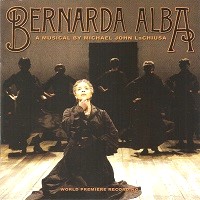 Off-Broadway Cast,
Off-Broadway Cast,  (2.5 / 5) This recording begins with a thrilling and percussive “Prologue” that lays out the haunting story of Bernarda Alba, the recently-widowed mother of five daughters. After her husband’s death, Bernarda refuses to allow any member of her household to leave their home or interact with anyone from the outside world for a set mourning period of eight years. Armed with this concept, the composer, Michael John LaChuisa has packed his score with strong Spanish flamenco beats and rhythms that pay tribute to the source material, Federico Garcia Loca’s drama The House of Bernarda Alba. A strong nod should also be given to Michael Starobin for his fantastic, rhythmic orchestrations throughout the album. But although this musical was certainly an artistic success on stage, it’s difficult to recommend the recording due to LaChiusa’s aversion to melody and song structure. While he has here gifted us with appealing songs such as “Love Let Me Sing You” and “The Smallest Stream,” the bulk of the album is filled with difficult, meandering melodies that hold the listener at arm’s length from what should be a compelling and harrowing story. In the recording’s favor, it does feature Phylicia Rashad as the titular mother. Rashad’s Bernarda is filled with bitterness that has turned to oppressive anger, and she wrings every drop of emotion from the aforementioned “The Smallest Stream.” The rest of the cast of this Lincoln Center Theater production is an abundance of riches, with Saundra Santiago, Judith Blazer, Sally Murphy, Daphne Rubin-Vega, and Nikki M. James as the five daughters. Each of their unique voices are recognizable throughout, but with such an incredible group of performers, it’s a shame they aren’t given more standout material. Overall, this album is not an easy listen; the dark subject matter and complex score make for an intellectually stimulating listening experience, but not always a pleasurable one. — Forrest Hutchinson
(2.5 / 5) This recording begins with a thrilling and percussive “Prologue” that lays out the haunting story of Bernarda Alba, the recently-widowed mother of five daughters. After her husband’s death, Bernarda refuses to allow any member of her household to leave their home or interact with anyone from the outside world for a set mourning period of eight years. Armed with this concept, the composer, Michael John LaChuisa has packed his score with strong Spanish flamenco beats and rhythms that pay tribute to the source material, Federico Garcia Loca’s drama The House of Bernarda Alba. A strong nod should also be given to Michael Starobin for his fantastic, rhythmic orchestrations throughout the album. But although this musical was certainly an artistic success on stage, it’s difficult to recommend the recording due to LaChiusa’s aversion to melody and song structure. While he has here gifted us with appealing songs such as “Love Let Me Sing You” and “The Smallest Stream,” the bulk of the album is filled with difficult, meandering melodies that hold the listener at arm’s length from what should be a compelling and harrowing story. In the recording’s favor, it does feature Phylicia Rashad as the titular mother. Rashad’s Bernarda is filled with bitterness that has turned to oppressive anger, and she wrings every drop of emotion from the aforementioned “The Smallest Stream.” The rest of the cast of this Lincoln Center Theater production is an abundance of riches, with Saundra Santiago, Judith Blazer, Sally Murphy, Daphne Rubin-Vega, and Nikki M. James as the five daughters. Each of their unique voices are recognizable throughout, but with such an incredible group of performers, it’s a shame they aren’t given more standout material. Overall, this album is not an easy listen; the dark subject matter and complex score make for an intellectually stimulating listening experience, but not always a pleasurable one. — Forrest Hutchinson 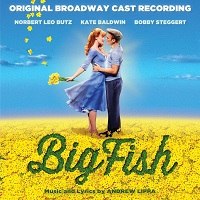
 (3 / 5) Big Fish arrived on Broadway in 2013 with a score by Andrew Lippa and was imaginatively directed by Susan Stroman, but it did not last more than 100 performances. Fortunately, this recording has preserved much of the show’s charm. A strong cast includes Tony Award winner Norbert Leo Butz as Edward Bloom, a yarn-spinning, traveling salesman who dazzles his son, Will (a pleasant-sounding Bobby Steggart), with stories of adventure that stretch the imagination. These oftentimes unbelievable tales strain Edward’s relationship with his son and frustrate his long-suffering wife, played by Kate Baldwin. Butz sounds fantastic throughout; he’s youthful and charming in the opening number, “Be the Hero,” and inspiring in his solo, “Fight the Dragons.” Baldwin’s endearing soprano is much appreciated in softer moments such as the lovely “ I Don’t Need A Roof.” The score culminates with the highly emotional song “How It Ends,” a reconciliation for father and son. Unfortunately, between the effective songs for the main characters, there are several production numbers featuring other characters that do not come across nearly as well on the recording and may serve to make this album a slightly frustrating, but certainly not a profitless, listening experience. — Forrest Hutchinson
(3 / 5) Big Fish arrived on Broadway in 2013 with a score by Andrew Lippa and was imaginatively directed by Susan Stroman, but it did not last more than 100 performances. Fortunately, this recording has preserved much of the show’s charm. A strong cast includes Tony Award winner Norbert Leo Butz as Edward Bloom, a yarn-spinning, traveling salesman who dazzles his son, Will (a pleasant-sounding Bobby Steggart), with stories of adventure that stretch the imagination. These oftentimes unbelievable tales strain Edward’s relationship with his son and frustrate his long-suffering wife, played by Kate Baldwin. Butz sounds fantastic throughout; he’s youthful and charming in the opening number, “Be the Hero,” and inspiring in his solo, “Fight the Dragons.” Baldwin’s endearing soprano is much appreciated in softer moments such as the lovely “ I Don’t Need A Roof.” The score culminates with the highly emotional song “How It Ends,” a reconciliation for father and son. Unfortunately, between the effective songs for the main characters, there are several production numbers featuring other characters that do not come across nearly as well on the recording and may serve to make this album a slightly frustrating, but certainly not a profitless, listening experience. — Forrest Hutchinson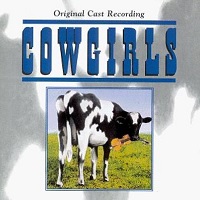
 (2 / 5) This cute little show, with music and lyrics by Mary Murfitt and a book by Betsy Howie, had a decent run Off-Broadway in 1996. The song titles alone — “From Chopin to Country,” “Love’s Sorrow,” “Don’t Call Me Trailer Trash,” “Saddle Tramp Blues,” “They’re All Cowgirls to Me” — give you an idea of what sort of entertainment you’re in for if you give the cast album a listen. The material is very slight but lots of fun, and the charming cast consists of co-author Murfitt and Howie plus Rhonda Coullet, Mary Ehrlinger, Lori Fischer, and Jackie Sanders. They all give their all, and the recording is a pleasant diversion — Michael Portantiere
(2 / 5) This cute little show, with music and lyrics by Mary Murfitt and a book by Betsy Howie, had a decent run Off-Broadway in 1996. The song titles alone — “From Chopin to Country,” “Love’s Sorrow,” “Don’t Call Me Trailer Trash,” “Saddle Tramp Blues,” “They’re All Cowgirls to Me” — give you an idea of what sort of entertainment you’re in for if you give the cast album a listen. The material is very slight but lots of fun, and the charming cast consists of co-author Murfitt and Howie plus Rhonda Coullet, Mary Ehrlinger, Lori Fischer, and Jackie Sanders. They all give their all, and the recording is a pleasant diversion — Michael Portantiere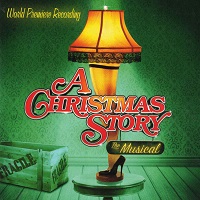
 (4 / 5) In this stage adaptation of the film of the same title about a boy who really wants a BB gun for Christmas, songwriters Benj Pasek and Justin Paul demonstrate their craft through songs too good-natured and sturdily built to be faulted for their basically pastiche elements. There are jazzy tap numbers, western-inspired romps, and lots of jingling holiday fare with golden-age melodic coutours. The pair clearly had a blast assembling this score, even if the film’s episodic structure doesn’t always lend itself to effective musical storytelling; sequences like “Ralphie to the Rescue” and the endless “A Major Award” suggest that some of the dance arrangements and extended numbers could have been trimmed for the recording. But the otherwise warmly jocular score froths into something more soaring in three tracks that show off Pasek and Paul’s gifts for inventing joyous melody and showcasing kids’ voices: “Counting Down to Christmas,” “Somewhere Hovering Over Indiana,” and the gentle title song are all gems that make a strong case for this album as a keeper. Its warmth and shimmer are largely due to the gorgeous orchestrations of Larry Blank, perhaps some of the best of the 2010s in their brassy clarity and Christmasy sumptuousness. The cast of this “World Premiere Recording” largely represents the 2011 pre-Broadway touring company, with the exceptions of Liz Callaway as Ralphie’s mother and Tom Wopat as the grownup Narrator. (These performers never played these roles on stage.) Callaway is a redemptive presence, her tender, honest tone always keeping the ballads on the safe side of saccharine. And Clarke Hallum makes a meal out of Ralphie’s substantial amount of material, which allow for some astonishingly non-grating pre-teen belting. — Dan Rubins
(4 / 5) In this stage adaptation of the film of the same title about a boy who really wants a BB gun for Christmas, songwriters Benj Pasek and Justin Paul demonstrate their craft through songs too good-natured and sturdily built to be faulted for their basically pastiche elements. There are jazzy tap numbers, western-inspired romps, and lots of jingling holiday fare with golden-age melodic coutours. The pair clearly had a blast assembling this score, even if the film’s episodic structure doesn’t always lend itself to effective musical storytelling; sequences like “Ralphie to the Rescue” and the endless “A Major Award” suggest that some of the dance arrangements and extended numbers could have been trimmed for the recording. But the otherwise warmly jocular score froths into something more soaring in three tracks that show off Pasek and Paul’s gifts for inventing joyous melody and showcasing kids’ voices: “Counting Down to Christmas,” “Somewhere Hovering Over Indiana,” and the gentle title song are all gems that make a strong case for this album as a keeper. Its warmth and shimmer are largely due to the gorgeous orchestrations of Larry Blank, perhaps some of the best of the 2010s in their brassy clarity and Christmasy sumptuousness. The cast of this “World Premiere Recording” largely represents the 2011 pre-Broadway touring company, with the exceptions of Liz Callaway as Ralphie’s mother and Tom Wopat as the grownup Narrator. (These performers never played these roles on stage.) Callaway is a redemptive presence, her tender, honest tone always keeping the ballads on the safe side of saccharine. And Clarke Hallum makes a meal out of Ralphie’s substantial amount of material, which allow for some astonishingly non-grating pre-teen belting. — Dan Rubins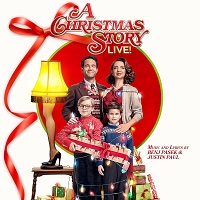
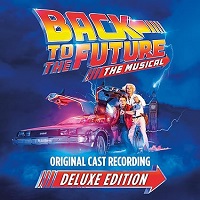
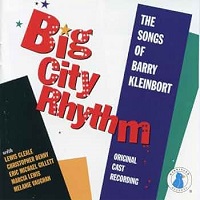
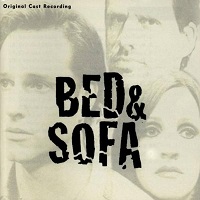
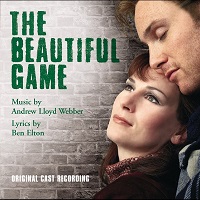
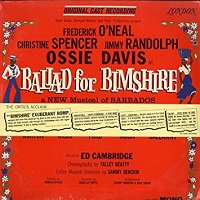
 (1 / 5) This Off-Broadway oddity probably got produced because of the reputation of its composer, Irving Burgie — also known as Lord Burgess. Having written several songs that were popularized by Harry Belafonte, Burgie was one of the most prominent calypso writers of the period. But this show is more well meaning than well crafted; the writers and production team all had limited musical theater experience, and they produced a piece that, judging from the cast album, doesn’t seem to know what it wants to do or how to do it. Ballad for Bimshire clearly had a book — co-producer and co-star Ossie Davis, a driving force behind the production, narrates the story, but it’s not compelling and more than a little amorphous. The lyrics are negligible, which leaves only the tunes. They’re frequently appealing but, because they’re on their own, dramatically unrewarding. — David Wolf
(1 / 5) This Off-Broadway oddity probably got produced because of the reputation of its composer, Irving Burgie — also known as Lord Burgess. Having written several songs that were popularized by Harry Belafonte, Burgie was one of the most prominent calypso writers of the period. But this show is more well meaning than well crafted; the writers and production team all had limited musical theater experience, and they produced a piece that, judging from the cast album, doesn’t seem to know what it wants to do or how to do it. Ballad for Bimshire clearly had a book — co-producer and co-star Ossie Davis, a driving force behind the production, narrates the story, but it’s not compelling and more than a little amorphous. The lyrics are negligible, which leaves only the tunes. They’re frequently appealing but, because they’re on their own, dramatically unrewarding. — David Wolf